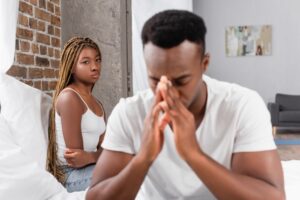Understanding the Intersection of Identity and Addiction
In recent decades, society and culture have made significant strides toward LGBTQ+ acceptance. From the decriminalization of homosexuality to the legalization of gay marriage, LGBTQ+ individuals now experience less legal discrimination and more freedom to be who they are. However, complete equality is still a goal to be achieved. Discrimination, isolation, and addiction are closely related, and the lack of freedom to be honest about one’s identity can impact one’s relationship with substances. This article explores the relationship between addiction and discrimination and the transformative power of embracing one’s true self.
Addiction in the LGBTQ+ Community
Rates of alcohol and drug addiction are higher in the LGBTQ+ community, but they do not affect everyone under the umbrella equally or at the same rate. Historically, LGBTQ+ culture has been closely linked to bars and clubs, as these venues were some of the only places where LGBTQ+ individuals could meet privately and be somewhat free from harassment. This association presents difficulties for LGBTQ+ people in recovery, as it can be challenging to meet others without visiting these environments, leading to exposure to substances or feelings of isolation.
Substance Misuse Patterns
Within the LGBTQ+ community, substance misuse disorders for illicit drugs are about twice as high for gay and bisexual men compared to men in general. Alcohol misuse is about one-third higher, and stimulant use is approximately three times higher among gay and bisexual men. Gay and bisexual women are more likely to abuse alcohol than heterosexual women but are also more likely to seek help for their addiction.
Bisexual individuals often face unique challenges. Studies suggest that bisexuality is associated with a higher risk of substance misuse than both exclusively gay or heterosexual identities. Unfortunately, data focusing exclusively on bisexual women or men is sparse.
In the transgender community, higher rates of addiction, including nicotine addiction, are observed. Generally, trans men misuse substances more than trans women, except for methamphetamine.

As you learn to address bias and discrimination against those with drug addiction, it is…

Recovery from addiction is not just a personal journey; it impacts every relationship in your…

Supporting a loved one through addiction is a journey that requires deep understanding and empathy.…
Identity Struggles and Substance Abuse
The most common theory explaining why substance misuse is higher in the LGBTQ+ community is minority stress. The isolation and discrimination associated with minority status lead to self-medication using substances to numb feelings of shame, loneliness, and anxiety. This may explain why bisexual individuals face higher levels of substance misuse, as they can struggle to be fully accepted by both heterosexuals and the gay community.
Isolation, Stigma, and Addiction
A lack of both self-acceptance and acceptance from society significantly contributes to loneliness, which is much higher among people who struggle with addiction. Those who lack acceptance from their peers also lack the support to confront and seek help for their substance misuse, worsening the cycle of addiction. Loneliness is associated with poor mental and physical health, low self-esteem, and high-risk behaviors.
Embracing Identity for Recovery
Overcoming addiction requires embracing one’s identity and finding strength in who you are. For many LGBTQ+ individuals, this means breaking free from shame and isolation. Here are some ways to support a loved one or seek help:
- Encourage Self-Acceptance: Support your loved one in embracing their true self and finding pride in their identity.
- Create a Supportive Environment: Foster an inclusive and accepting home environment where your loved one feels safe and valued.
- Seek Community Support: Encourage involvement in LGBTQ+ groups and activities that do not center around substances, such as support groups or community events.
- Promote Mental Health: Recognize the importance of mental health in recovery and encourage professional counseling or therapy.
The Importance of Inclusivity in Addiction Treatment
Getting treatment for addiction is a brave step and often a vulnerable time for a person. Ensuring a safe and inclusive environment is crucial for effective recovery. Treatment centers should:
- Provide Safe Spaces: Create environments where LGBTQ+ individuals feel safe and respected.
- Offer Inclusive Care: Train staff on the specific struggles of the LGBTQ+ community to provide empathetic and supportive care.
- Address Trauma: Recognize the higher rates of trauma and PTSD in the LGBTQ+ community and offer trauma-informed care where appropriate.
- Facilitate Group Therapy: Provide group therapy sessions for LGBTQ+ individuals to reduce isolation and form bonds with others who have faced similar struggles.
By fostering a supportive and inclusive environment, we can help LGBTQ+ individuals in South Africa and beyond achieve lasting recovery and embrace their true selves.

Recovery from addiction is not just a personal journey; it impacts every relationship in your…

As you learn to address bias and discrimination against those with drug addiction, it is…

In the journey of recovery from addiction in South Africa, you may often grapple with…

